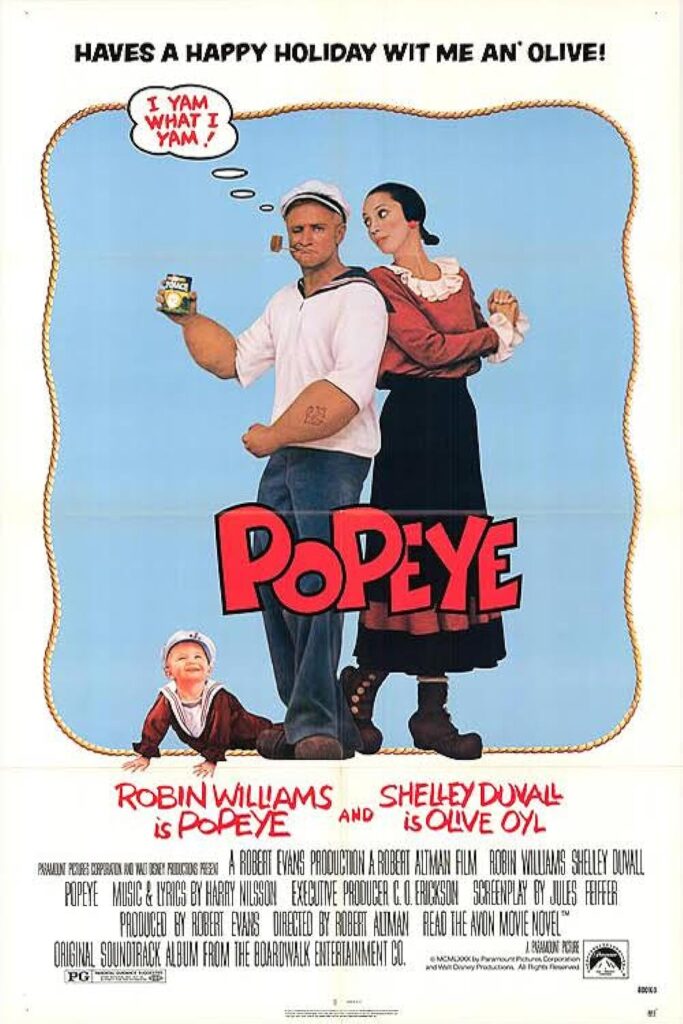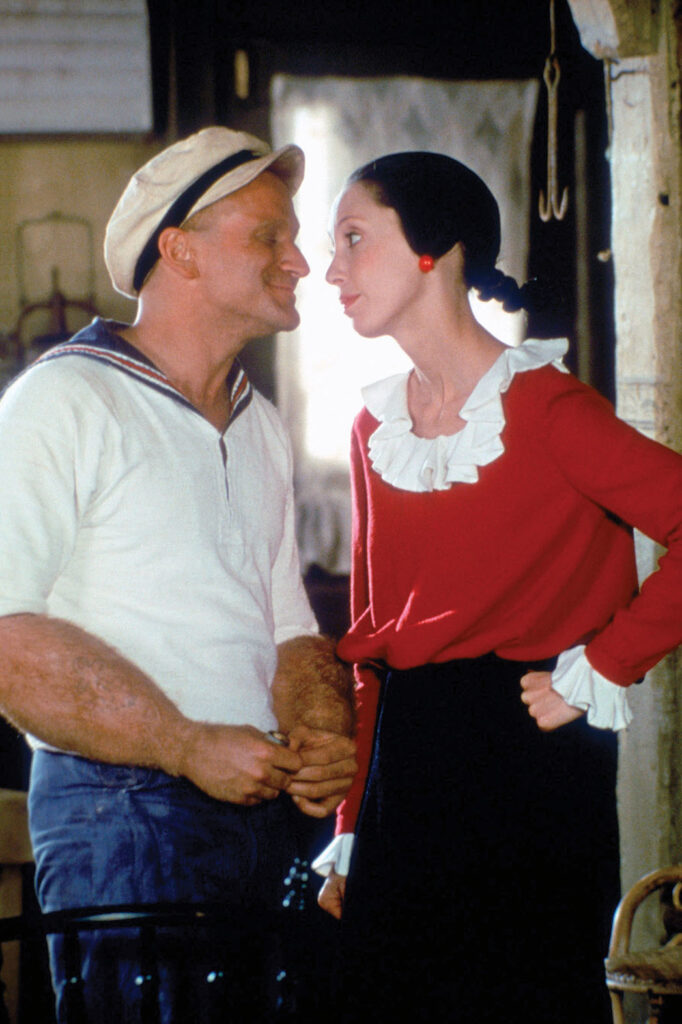Popeye Christian Review

Imagine stepping into a world where laughter echoes through quirky seaside streets, where larger-than-life characters mingle with everyday struggles, and where spinach becomes a symbol of strength, not just in muscles but in the soul. This is the whimsical realm of “Popeye,” Robert Altman’s 1980 film adaptation of the beloved comic strip.
Unveiling the Journey of Popeye
At its heart, “Popeye” is a tale of journeying—a journey of the soul as much as the quest for a long-lost father. Robin Williams breathes life into Popeye, with his distinctive mumbling and comically exaggerated muscles. He’s not just a sailor; he’s a wanderer seeking familial ties amidst the salty winds of Sweethaven. His encounter with Olive Oyl, portrayed by Shelley Duvall with endearing awkwardness, sparks a journey of love and kinship that transcends the mundane.
Themes of Redemption and Belonging
In the backdrop of Sweethaven’s whimsical charm lies a deeper narrative of redemption and belonging. Popeye’s arrival disrupts the town’s equilibrium, challenging the status quo represented by Bluto, the brutish antagonist played by Paul L. Smith. Bluto’s dominance mirrors earthly powers that oppress and exploit, echoing biblical themes of spiritual warfare.
The film delicately weaves themes of forgiveness and reconciliation, resonating with Christian teachings of grace and second chances. Popeye’s relationship with Swee’Pea, the abandoned baby he adopts, symbolizes the divine call to care for the vulnerable and embrace unexpected blessings. As Popeye navigates his tumultuous relationship with his father, Poopdeck Pappy, portrayed by Ray Walston, the film explores the complexities of familial love and the healing power of forgiveness—a narrative thread deeply rooted in Christian theology.
The Strength Found in Weakness
Central to Popeye’s character is his reliance on spinach—a quirky trait that becomes a powerful metaphor. Initially portrayed as a source of physical strength, spinach evolves into a symbol of inner fortitude—a reminder of the biblical paradox where strength is perfected in weakness. Popeye’s transformation after consuming spinach mirrors the Christian journey of discovering divine strength in moments of weakness and doubt.
Musical Harmony and Emotional Depth
Harry Nilsson’s enchanting musical score enriches the film’s emotional tapestry, resonating with Christian hymns that uplift the soul. Songs like “He Needs Me” and “Swee’Pea’s Lullaby” evoke a sense of divine providence amidst life’s uncertainties. They underscore Popeye’s emotional journey, from grappling with paternal abandonment to embracing newfound love and fatherhood.
Visual Allegory and Symbolism
Robert Altman’s direction imbues Sweethaven with a storybook aesthetic, blending whimsy with poignant realism. The town’s vibrant colors and quirky inhabitants reflect a world where divine providence intersects with human frailty. The film’s visual allegories—from Popeye’s battles with Bluto to his ultimate triumph over adversity—resonate with Christian narratives of spiritual warfare and ultimate victory.

A Christian Parable in Modern Cinematic Form
“Popeye” transcends its comic origins to become a parable for modern audiences. It invites viewers into a journey of faith, where laughter and tears intertwine, and where characters grapple with universal themes of love, loss, and redemption. Popeye’s resilience against Bluto’s tyranny echoes the biblical call to resist evil and stand firm in faith.
The film’s portrayal of Popeye’s sacrificial love for Swee’Pea and Olive Oyl resonates with Christ-like virtues of selflessness and compassion. His confrontation with Bluto on Scab Island becomes a metaphor for spiritual battles fought and won through divine strength. As Popeye embraces his identity as a father and reconciles with Poopdeck Pappy, the film celebrates the transformative power of familial love—a testament to the Christian values of forgiveness and reconciliation.
Conclusion: Embracing the Spirit of Popeye
In conclusion, “Popeye” captivates audiences with its blend of humor, heart, and timeless themes. Robin Williams’ portrayal of Popeye, supported by a stellar cast and enchanting musical score, elevates the film beyond mere entertainment to a profound exploration of faith and resilience. From Popeye’s quirky love for spinach to his journey of self-discovery and familial reconciliation, the film resonates with Christian teachings on love, forgiveness, and the enduring strength found in faith.
Rating: 8/10
With its whimsical charm and profound spiritual undertones, “Popeye” earns its place as a cinematic gem that delights, inspires, and invites viewers into a world where even the quirkiest of heroes can teach profound lessons of faith and love






